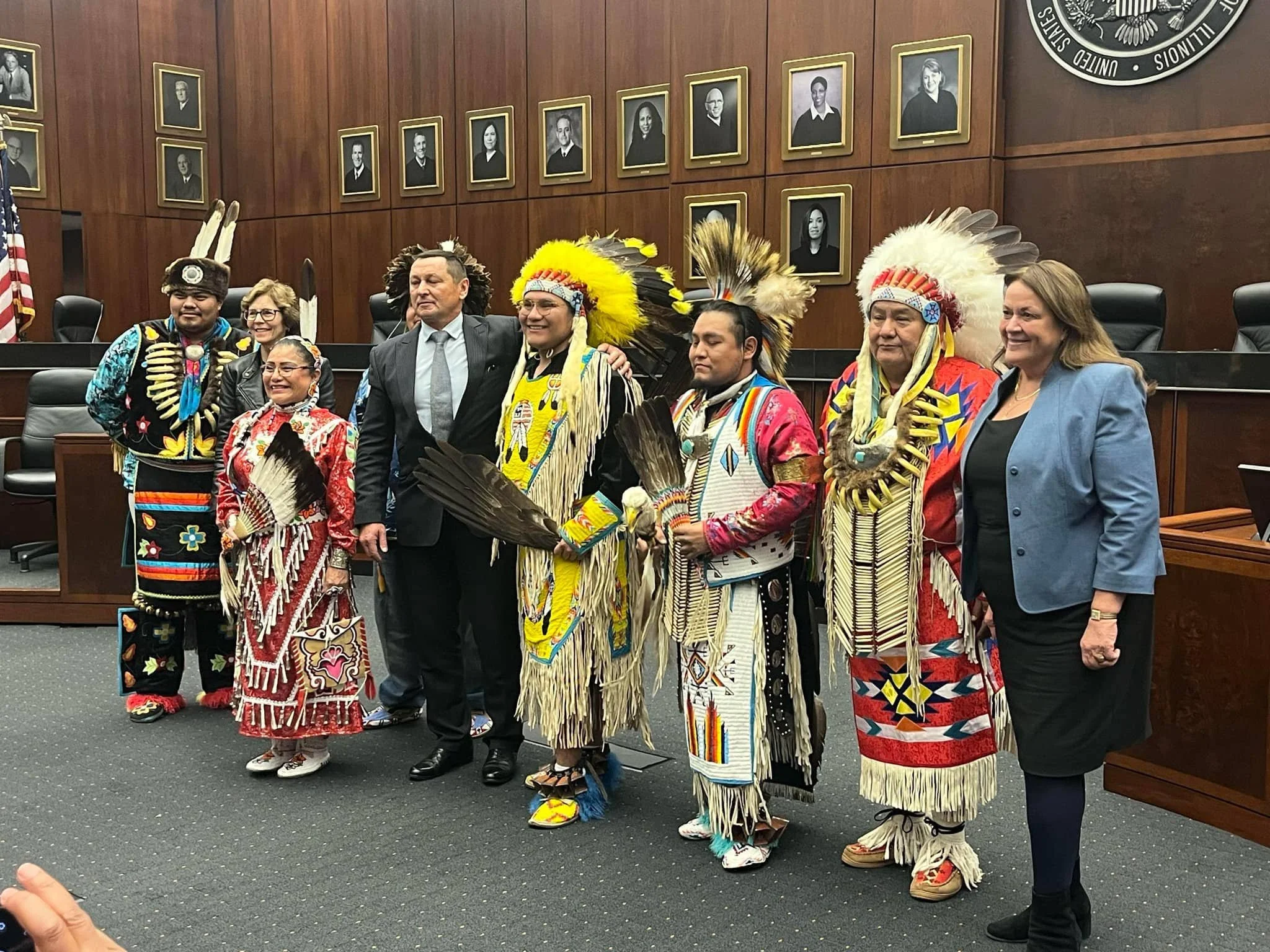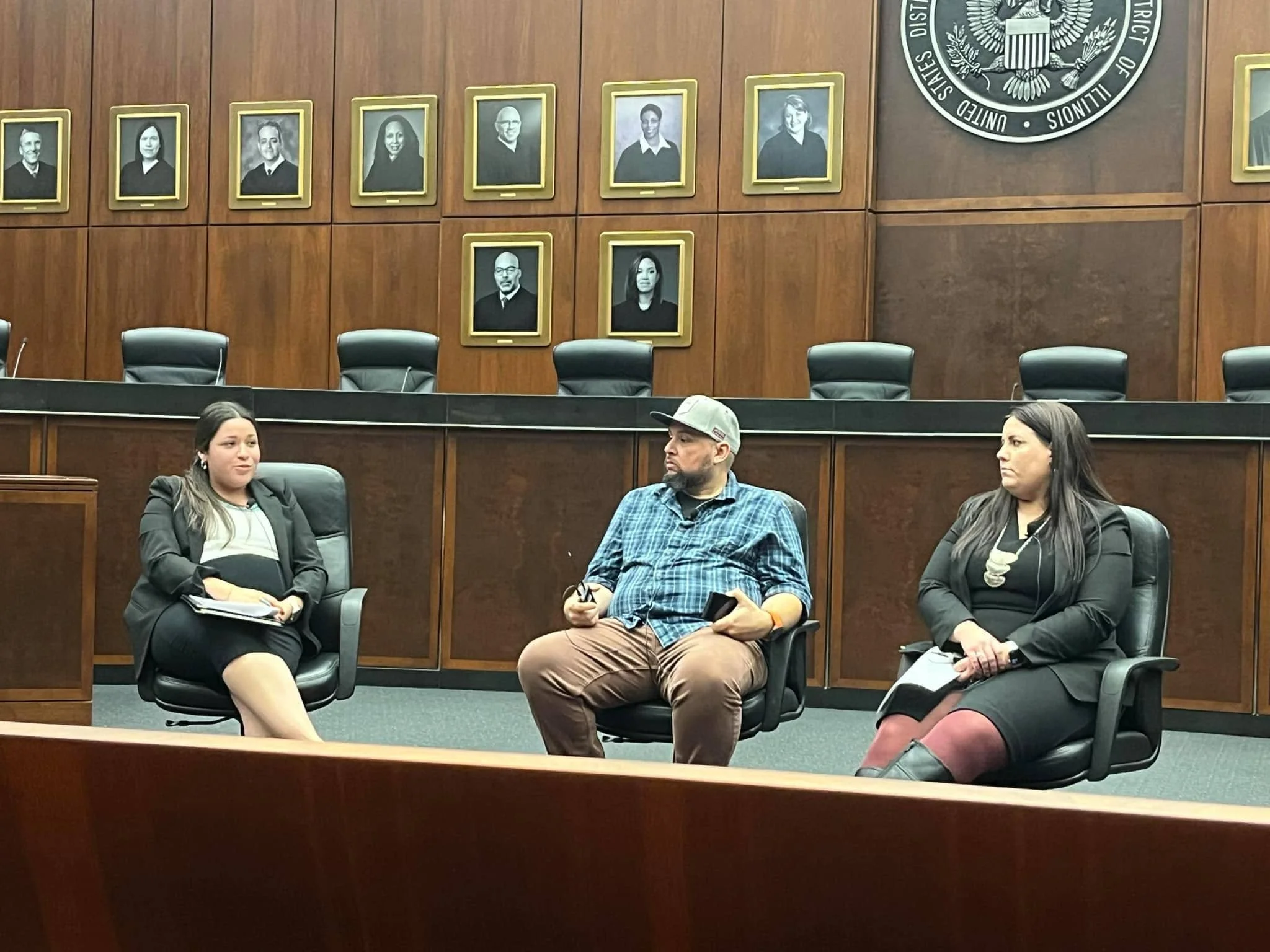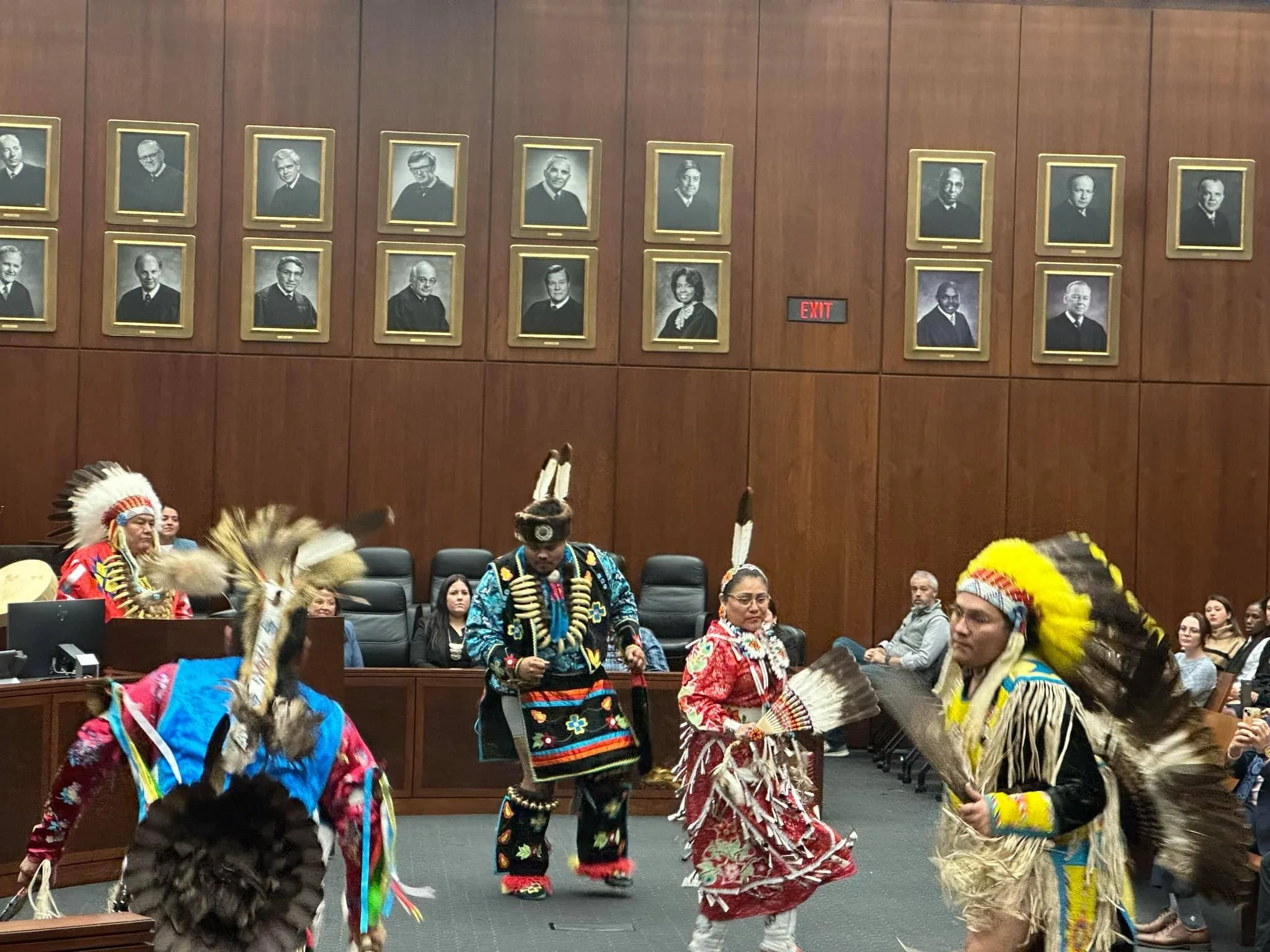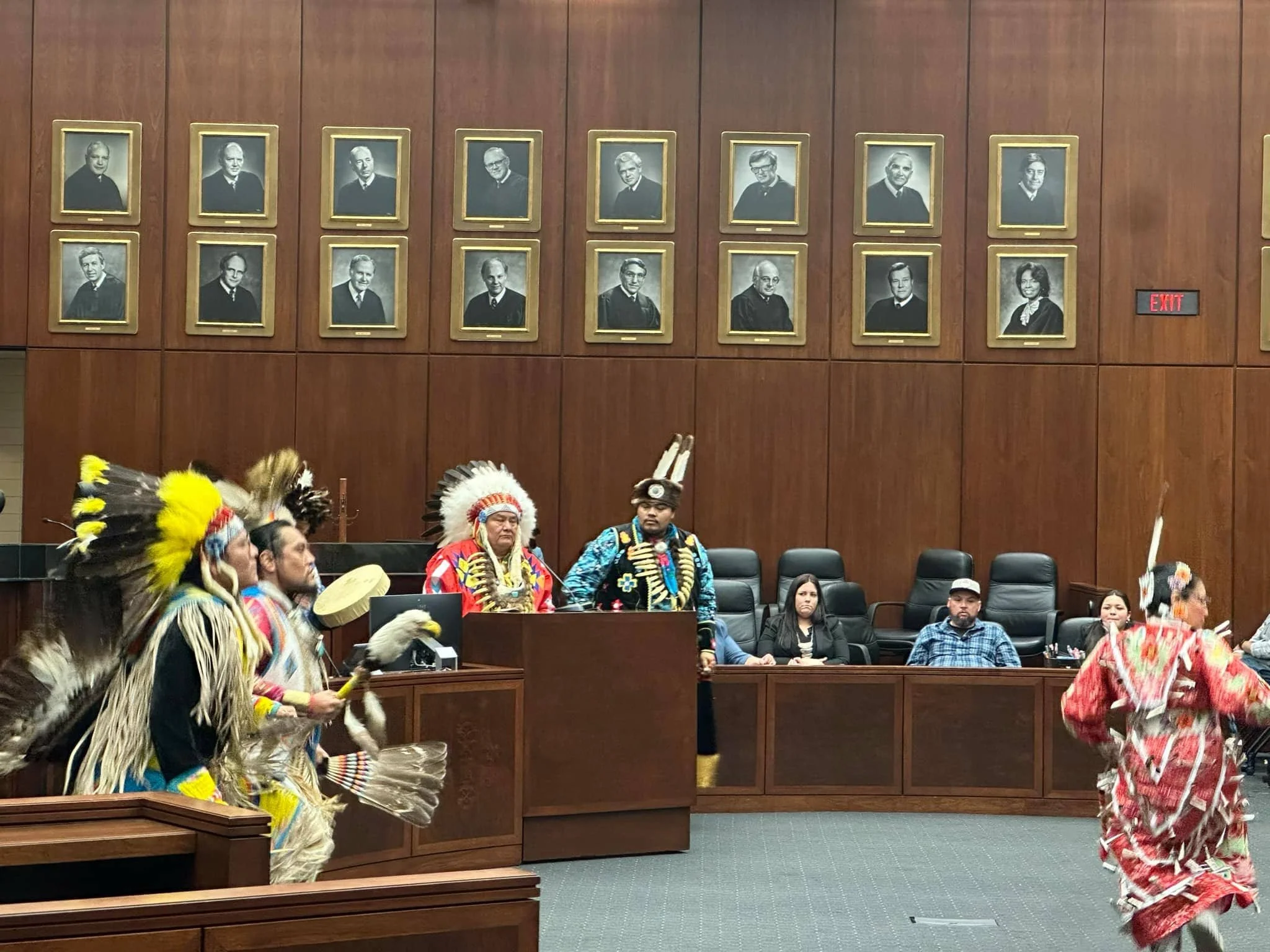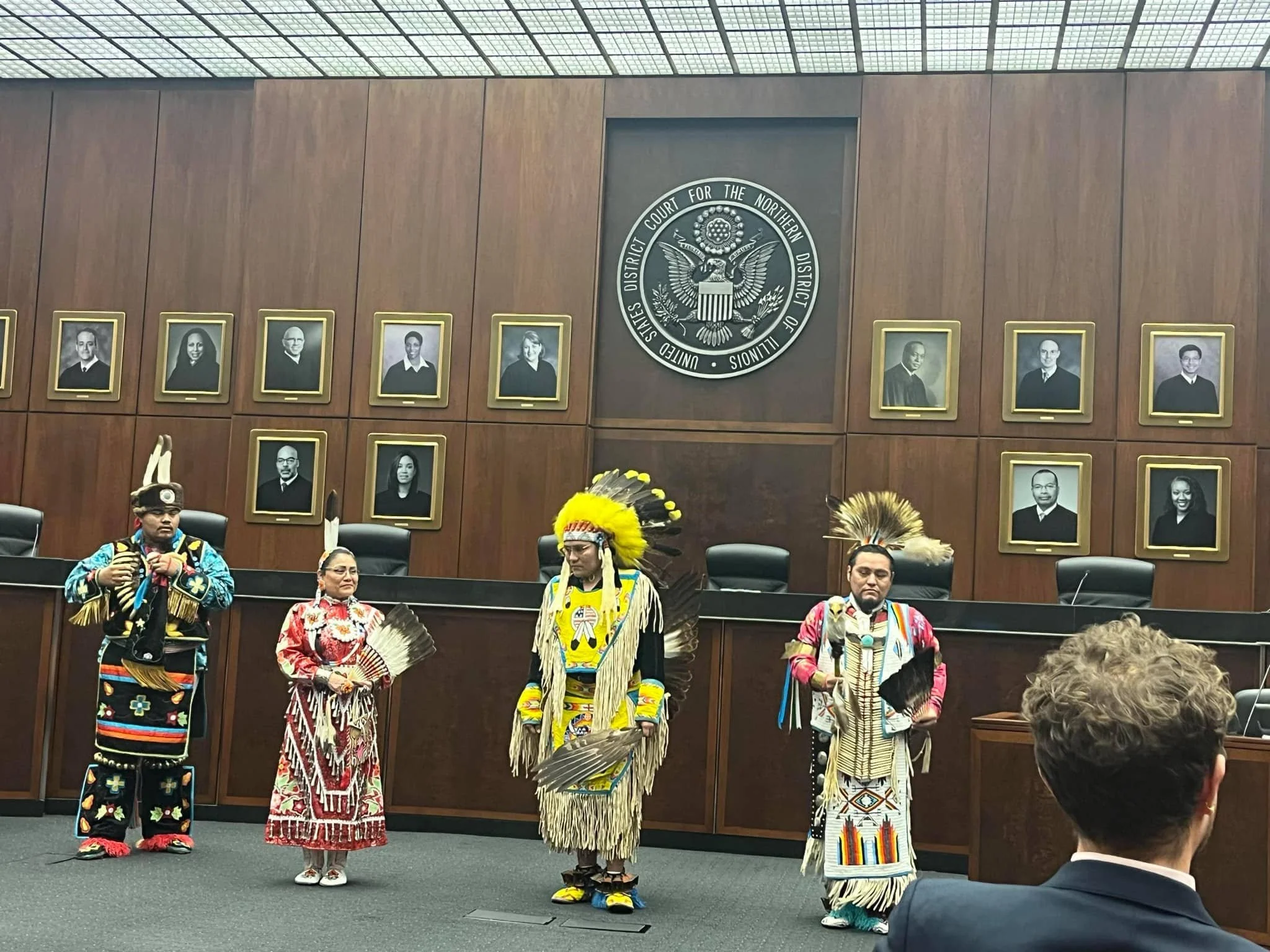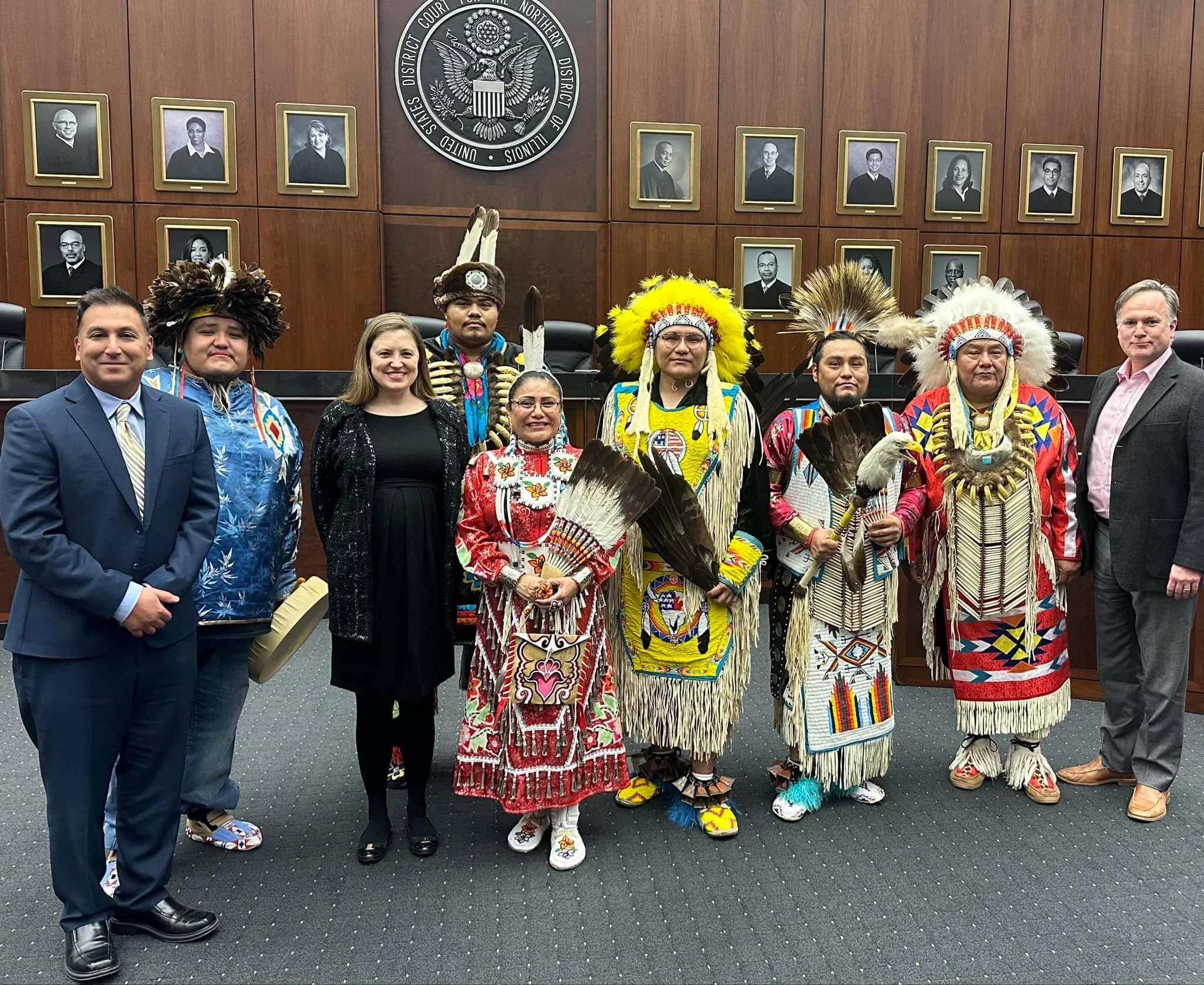Indian Citizenship Act of 1924: Highlights from Chicago's Centennial Event
Federal Bar Association Chicago Chapter Leadership and the Black Hawk Performance Company
On November 20, 2024, a significant event was held in Chicago to commemorate the 100th anniversary of the Indian Citizenship Act of 1924, bringing together legal experts, community leaders, and advocates to reflect on the act's historical and contemporary implications. Hosted by the Federal Bar Association Chicago Chapter and the U.S. District Court for the Northern District of Illinois, the event featured a distinguished panel moderated by Cheyenne Rivera, Associate at Greenberg Traurig. Panelists included Torey Dolan, Hastie Fellow at the University of Wisconsin Law School, and Jay Young, Co-Executive Director of the American Indian Center of Chicago. The program highlighted the act's role in granting U.S. citizenship to Native Americans and its enduring legacy on voting rights, tribal identity, and self-determination.
The event began with a cultural tribute from the Black Hawk Performance Company, emphasizing the importance of Native traditions and resilience. A panel discussion followed, exploring the legal, social, and cultural impacts of the act, as well as the challenges Native communities have faced in securing full participation in American democracy.
A Centennial Celebration of the Indian Citizenship Act of 1924
The Indian Citizenship Act of 1924 was a pivotal moment in U.S. history, granting citizenship to all Native Americans born within the United States. This milestone came decades after Native Americans were excluded from the protections of the 14th Amendment, as affirmed by the Supreme Court decision in Elk v. Wilkins (1884). Before 1924, Native Americans could only gain citizenship through specific pathways such as the Dawes Act of 1887, which required individuals to relinquish communal tribal ties in exchange for U.S. citizenship.
The act was passed during a period when Native Americans were making significant contributions to the United States, including serving in World War I despite being excluded from the draft. However, the act was also shaped by federal policies aimed at assimilation, as it sought to redefine the relationship between Native Americans and the federal government by integrating Native individuals into U.S. civic life while diminishing the sovereignty of tribal nations.
While the act granted formal citizenship, it did not address the broader systemic challenges faced by Native Americans, such as access to voting and representation. This centennial event reflected on how the act served as both a step forward and a tool for enforcing assimilation policies.
Exploring Barriers to Voting Rights Following the Indian Citizenship Act of 1924
Although the Indian Citizenship Act of 1924 granted Native Americans formal citizenship, it did not guarantee full participation in democratic processes. Many states imposed voting restrictions that mirrored Jim Crow laws, effectively disenfranchising Native populations. These restrictions included literacy tests, poll taxes, and other barriers that targeted Native Americans, particularly in the western and southern United States. It was not until the passage of the Voting Rights Act of 1965 that significant federal protections addressed these injustices.
Today, Native communities continue to face obstacles to voting, particularly in rural and reservation areas where limited access to polling stations, restrictive voter ID laws, and inadequate resources remain significant challenges. The centennial event underscored how these systemic barriers are a continuation of historical disenfranchisement, demonstrating the need for ongoing advocacy to ensure equal access to voting for Native populations.
The discussions during the event emphasized that while the Indian Citizenship Act of 1924 symbolized progress, its implementation was incomplete without the full realization of voting rights. These challenges reflect broader issues of representation and participation that Native communities still encounter.
Redefining Native Identity and Citizenship After the Indian Citizenship Act of 1924
The Indian Citizenship Act of 1924 also had profound implications for Native identity and citizenship. By granting U.S. citizenship, the act introduced a new dynamic in how Native Americans were defined under federal law. This shift was further shaped by the Indian Reorganization Act of 1934, which established blood quantum standards to determine tribal membership. These standards often created tensions within Native communities by emphasizing ancestry over cultural and communal connections.
Over time, these policies influenced how tribes defined their own membership criteria. Blood quantum standards, introduced as a federal framework, often limited eligibility for tribal citizenship and placed constraints on how tribes could govern themselves. This framework led to exclusionary practices, sometimes forcing individuals with deep cultural ties to their communities to be excluded from formal tribal membership.
In recent years, there has been a growing movement among tribes to redefine citizenship criteria to reflect cultural, rather than genetic, connections. This movement represents a broader effort to reclaim autonomy over tribal governance and ensure the inclusion of future generations. The centennial event provided a platform to discuss these complex issues, highlighting the ongoing evolution of Native identity in response to historical policies.
The Role of the American Indian Center of Chicago in Advocacy and Preservation
Urban Native organizations, such as the American Indian Center of Chicago (AIC), play a critical role in supporting Native communities. Established in 1953, the AIC was one of the first urban Native centers in the United States. It was founded in response to federal policies like the Indian Relocation Program, which encouraged Native individuals to move from reservations to urban areas. The center provided support to families navigating the challenges of transitioning to city life while maintaining their cultural identities.
The AIC continues to serve as a vital resource for Native communities in Chicago, offering educational programs, cultural workshops, and community events. These initiatives include youth programming, drum and moccasin-making workshops, and cultural celebrations that preserve and promote Native traditions. In addition to its cultural mission, the AIC advocates for the rights and resources needed to address the unique challenges faced by urban Native populations.
At the centennial event, the AIC’s contributions to fostering Native identity and community in metropolitan areas were highlighted as an example of how urban organizations can bridge historical and contemporary advocacy efforts. The AIC’s work exemplifies the importance of preserving cultural heritage while addressing the systemic issues that continue to affect Native populations.
Reflecting on Progress and Challenges Facing the Native American Community
The Citizenship and Voting Rights of Native Americans event commemorated the centennial of the Indian Citizenship Act of 1924 while addressing the act’s broader legacy. The discussions emphasized how the act, while a milestone in granting formal citizenship, also reflected federal policies aimed at assimilation and control. The event highlighted the incomplete realization of the act’s promises, particularly in areas such as voting rights, representation, and tribal sovereignty.
The centennial served as an opportunity to reflect on progress made over the past century and the challenges that remain. By fostering dialogue among legal professionals, policymakers, and Native advocates, the event reinforced the importance of continued efforts to address systemic barriers and advance the rights of Native communities. Events like this provide a platform for examining history, educating the public, and advocating for a more equitable future.
The legacy of the Indian Citizenship Act of 1924 remains a powerful reminder of the resilience and contributions of Native communities, as well as the ongoing work needed to achieve full recognition and participation in American society.
The Federal Bar Association Chicago Chapter encourages attendees and readers to continue the important conversations sparked by the Citizenship and Voting Rights of Native Americans event. Engage with event moderator Cheyenne Rivera and panelist Torey Dolan on LinkedIn to discuss the legal, cultural, and policy issues explored during the program.
To learn about new opportunities within the Federal Bar Association Chicago Chapter, check out our upcoming events!



